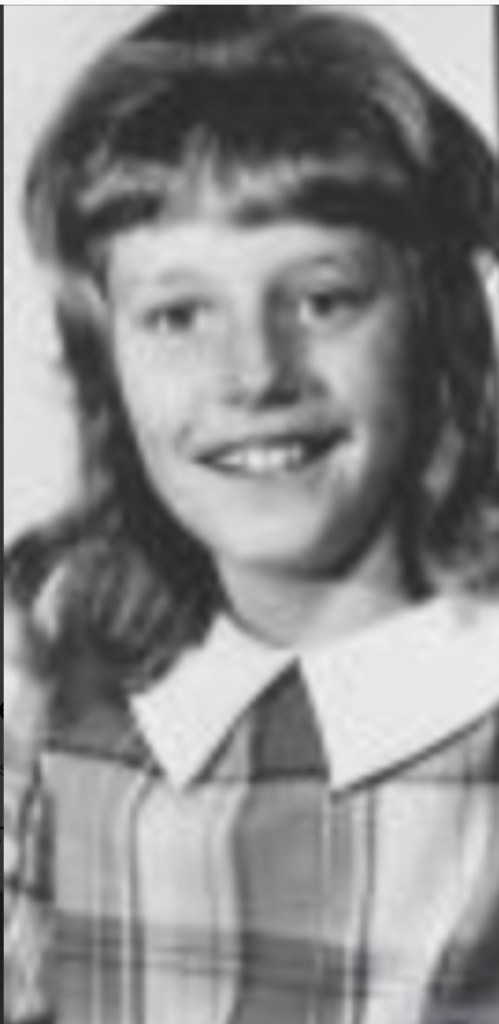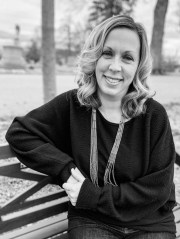Bridget spoke up and asked perhaps the most important question of him. “So what do YOU think happened that morning?”
We could see him collect his thoughts and temper any emotion that was flowing through him. After a brief pause he spoke and an alternative theory emerged. “I think he knew her from the street and possibly even knew it was her birthday. I don’t think it was a planned thing, but it was an opportunity and he took it and it went bad. He probably slowed down his car when he saw her walking and said something like, ‘Happy Birthday’ and ‘Do you need a ride?’ And he said he drove on when she said no, but I think that because she recognized him and knew she was running behind that she actually got in the car. Who knows what he said or did then, but at some point she would have had to have realized they weren’t going toward school. Maybe she resisted his advances or began to get upset when he was going a different direction from the school and he knew that she knew who he was and could tell on him. And I think he killed her somewhere else. Not on Rose Avenue and not on New Hope Road. Maybe in the car, maybe not. Then he drove her out there and left her.”
I’ve been listening to theories over the past year and so many different ones have been posed to me that I have learned to separate the emotion from it to think about the possibilities rationally. But sitting there quietly after hearing his words was much to digest and hard to bare. A giant knot twisted in my stomach comprised of sadness, hopelessness, and confusion and because of it, I found that I struggled to find words though my head was racing with questions.
The retired officer sat quietly and looked at Bridget and me as we both sat back in our seats, deflated for a moment. I finally gained my composure and asked the next question.
“You don’t think someone else was with him or participated in her murder, do you?”
“No, I don’t and I don’t recall there being any evidence of that.”
“And you didn’t find any evidence later in the investigation like her clothes or the shoes or anything?”
“We looked. One of the officers knew the owner of the house that _______ had lived in and we searched the entire house looking for a weapon possibly stashed somewhere. We sprayed Luminol too. We didn’t find anything. I didn’t really expect to though since she was most likely killed in a secondary location.”
“Do you know if the police have any evidence that may contain DNA so that it could possibly be solved?”
“I was finally able to talk to someone with the state police at the time and they told me that the evidence in the case no longer exists, but they had swabs at one time.”
Bridget and I were flabbergasted to hear this as we exchanged looks of complete astonishment and both asked the same questions in reaction. “Really? They said the evidence is gone? It’s not there? Are you sure?”
“Yes, after so much time has passed, it’s not totally out of the realm of possibility. They probably thought, ‘this case is so old and so cold it’s not going to be solved’ and they needed to make room for evidence in newer cases so out it went or it got lost in the shuffle through the years.” I made a note that hearing from the state police regarding what evidence they do or do not have is essential in moving forward with the case especially if swabs were taken and had been in police custody at one time. This kind of news I almost have to hear from the state police myself.
We worked to process all that we had just learned and in an effort to clear some thoughts from my congested mind, I asked the officer to hear us out because I wanted to lay out some pieces of information that we had noted regarding the two leading suspects and to see what his thoughts were. He agreed to listen and then Bridget and I began stating the facts that we had noted about each man so far.
“The man on the porch supposedly had someone clock in for him at work the day Cheryll was killed and _______ asked a friend to lie for him regarding his own whereabouts. You say that _______ knew about New Hope Road because of the junk yard nearby, but the man on the porch grew up out there. _______ thoroughly cleaned out his car after Cheryll disappeared, but the man on the porch supposedly had his car crushed. The man on the porch watched kids and followed school buses and made really creepy and inappropriate phone calls. ________ liked young teenage girls. For every fact you give me about the second suspect, I can counter it with a pretty equal fact about the man on the porch. And furthermore, ______ took the lie detector test, passed it, and also answered police questions while the man on the porch wouldn’t even talk to police and wouldn’t take a lie detector test.” I paused as I realized how tightly I was gripping my pen so I put it down and buried my face in the palms of my sweaty hands. I finished my thought process by revealing a slight hint of how I was feeling. “I’m frustrated because I don’t feel like the answer is as obvious as I thought it’d be.” The whole time we were talking, the seasoned officer listened intently, gently nodding, and even gave a slight sympathetic half-grin at one point as he could probably feel my passion and frustration increasing.
“Look, the man on the porch was a disturbed individual. I have no doubt that he was a pervert and he was sick. I believe he watched those kids and made creepy phone calls. I just cannot say that I saw any evidence to indicate that he was violent or to say that he is connected to this crime.” He continued. “__________ was known to be violent and I can’t stress to you enough that if and hopefully when you hear him answering the questions, you could just tell he knew something and that he was evil. I will never be able to shake that feeling. And you know what? I could be wrong, but I believe it so much– that I feel I know the answer– that I will go to my grave believing that _______ committed the crime. There is NO doubt in my mind. As far as I am concerned, the case was solved, but we weren’t able to prove it in a court in the traditional sense and that’s unfortunate.”
“You say that it all seemed so obvious to you. Why then didn’t the police charge him in 1971?” I didn’t want to sound condescending but I also was having trouble understanding how the police back then couldn’t see it, but twenty years later, he could.
“Back in the day they wanted in all wrapped up in a package–a confession, a murder weapon, a murder scene–and when they didn’t have those things the state police left town and that’s really where it ended.”
And just like Bridget asked Moira, she posed the same question to the police investigator sitting across from us. “Do you think we’ll be able to solve it?”
His answer was swift and brutally honest. “Not without physical evidence and I really don’t think there is any. And even if someone comes forward and says so-and-so told me that he did it, we won’t be able to prove it. So short of a confession and I don’t think you’re going to get that, I don’t think it’s going to have the kind of conclusion you’re hoping for.” I looked at him with a straight face, feeling defeat come over me. I turned my head and looked at Bridget sitting right next to me, expecting her to be sharing in the sadness. Instead, she was sitting upright on that couch, with her legs crossed and hands folded together on her knee, and with two parts confidence and one part sass, she smiled slightly and said, “Well, we’ll hopefully be proving you wrong about that.” I couldn’t help but let out a little giggle. Her retort was what I needed in that moment.
Eventually Bridget and I thanked the officer for giving us his time, sharing with us his memory and opinion of the case, and for opening himself up to experiencing the emotion that came from the dreadful unsolved case of a girl. I must admit that while I felt like I learned some new information from him, I found myself feeling more confused than ever. I was unsure about the guilt of this second suspect as much as I was unsure about the guilt of the man on the porch. The clarity I had sought didn’t come. Bridget and I agreed to just think it all through and to discuss our thoughts later so as not to taint each other’s take aways from the conversation. Then, we met our husbands and headed to the bar for a much needed drink while we did our best to chit chat about other things.
When we parted ways later in the evening, Bridget said, “Try to get some sleep and we can regroup tomorrow or the next day. Don’t stress yourself out over it. Besides, if you talk to Tom and Cheryll and ask for guidance, who knows what door might open that will help give us clarity and guide us in the right direction.” It’s such a blessing to have such a wise friend because oh, how right she was. I count this as another example of Bridget’s intuition sensing that the very next day another piece of the puzzle would be coming our way. They say dead men tell no tales, but sometimes, their friends do….


Are all of the people dead now that the cop thinks who may have killed her I think you should use names God I’m praying that you figure this out Cheryl needs justice
LikeLike
Two of them are that I know of.
LikeLike